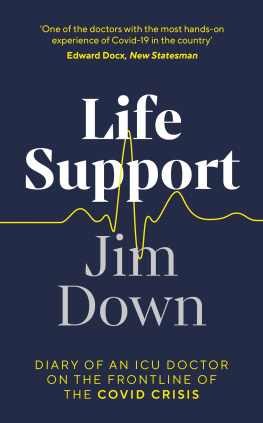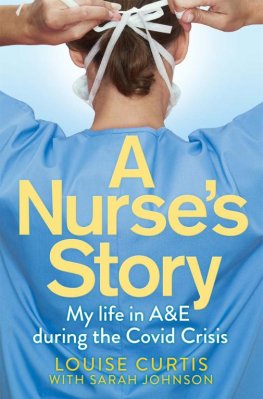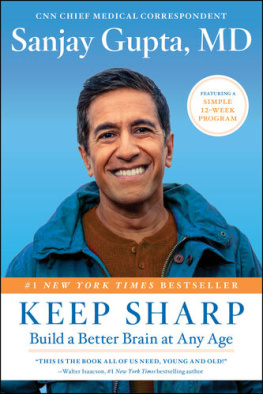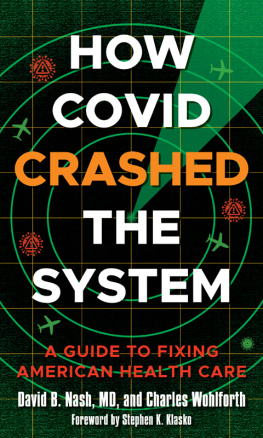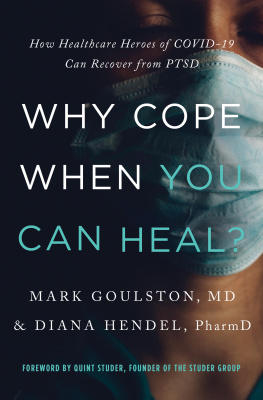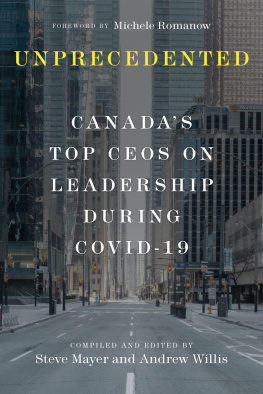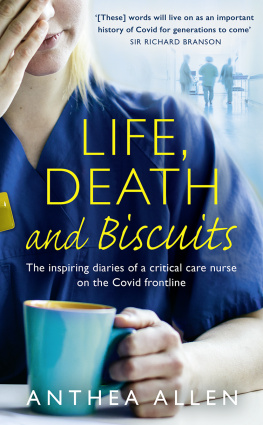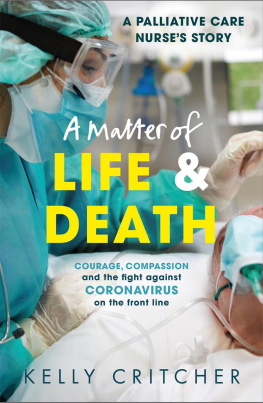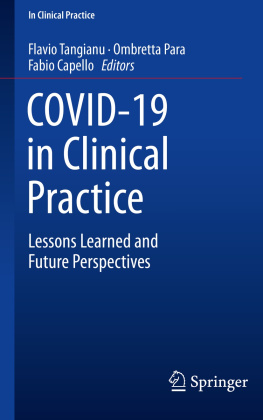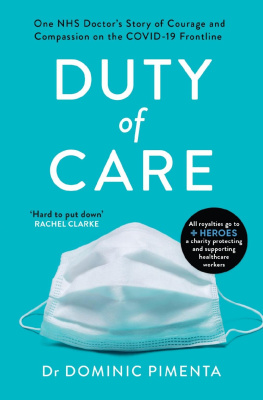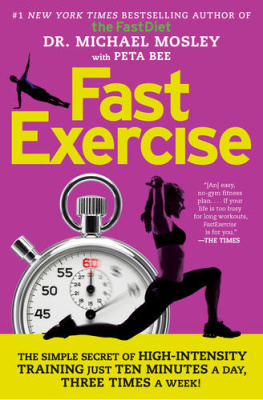Jim Down
LIFE SUPPORT
Diary of an ICU Doctor on the Frontline of the Covid Crisis

PENGUIN BOOKS
UK | USA | Canada | Ireland | Australia
New Zealand | India | South Africa
Penguin Books is part of the Penguin Random House group of companies whose addresses can be found at global.penguinrandomhouse.com.

First published by Viking in 2021
Copyright Jim Down, 2021
The moral right of the author has been asserted
ISBN: 978-0-241-50634-9
This ebook is copyright material and must not be copied, reproduced, transferred, distributed, leased, licensed or publicly performed or used in any way except as specifically permitted in writing by the publishers, as allowed under the terms and conditions under which it was purchased or as strictly permitted by applicable copyright law. Any unauthorized distribution or use of this text may be a direct infringement of the authors and publishers rights and those responsible may be liable in law accordingly.
To Mum and Dad
This book is a work of non-fiction based on the life, experiences and recollections of the author. To maintain patient confidentiality and to protect the privacy of individuals, some names have been changed and certain situations and individuals have been merged to further protect identities. Any similarities are purely coincidental. Many names of staff, patients and relatives have not been changed in line with the wishes of those individuals. All views expressed are the private views of the author and do not represent those of University College London Hospitals NHS Trust.
24 March 2020
Jim, they need you in bay 5. The young guy Adam in bed 36 has crashed his blood pressure.
Right, OK. Thanks. I walked back to the table of personal protective equipment (), dropped my valuables into the tray and picked a new mask from the box.
Has his temp gone up again?
Dont know. Ill ask. Taciana, the staff nurse whod called me, spoke into her walkie-talkie.
Jims coming in. Whats his temperature? In bed 36.
The walkie-talkie crackled.
What? she asked again. Sorry, can you repeat that?
41.8.
Shit, I muttered, adjusting the mask under my chin. I felt sick. Id seen Adam that morning on the ward round and set up a plan, so why was he so hot again? He was a young man, still in his twenties; his whole life was ahead of him. This was meant to be a disease of the old and frail. His next of kin was his mum. She was probably my age, but Id not met her. Relatives werent allowed in during Covid. He had a six-year-old son too, called Harry. This was not supposed to be happening. His temperature should have settled with the measures wed put in place. Viruses make you hot, but not this hot. This was like a drug reaction to ecstasy or one of the anaesthetic gases: malignant hyperthermia. He was life-threateningly hot again, and now his blood pressure was crashing.
I took three breaths in and out to check the masks seal. Air blew into my eyes, so I adjusted the strap and squeezed the metal band tight around the bridge of my nose.
What next?
I glanced at the laminated PPE donning guide hat.
As I pushed my arms into the waterproof gown, I tried to think logically. Cool him first then go from there. I pulled a second pair of gloves over the first and taped them to the gown.
Taciana, can you tell them to cool him with whatever theyve got wet towels, bladder irrigation, ice packs, fluids. And if theres another consultant around, can you ask them to join me?
Next came the plastic apron and finally a grey visor from the tray. The black ones gave me a headache within twenty minutes.
My consultant colleague Rik joined me at the donning table and began the laborious process. It was three tables in fact, hastily set up in a row like trestle cake stands at a village fte. They took up most of the corridor outside the bays, each piled high with boxes of masks, aprons, hats, gloves and visors. Underneath were more boxes, and downstairs hundreds more. Short strips of tape created a fringe around the edge of each table, pre-prepared to stick gloves to gowns. At the far end a large plastic tray overflowed with sandwich bags filled with the valuables of staff currently donned within the Covid bays.
I patted my chest, mentally checking off the items of PPE.
Ill tie you up.
Someone Id never seen before tied the back of my gown and apron.
Thanks. I mumbled, then raised my voice. Can we get and Echo machine into bay 5? And the crash trolley. And can you keep someone at the door for communication?
I checked the tapes on my gloves one final time.
And can you call his mother? I shouted to no one in particular.
And say?
Come in.

1. Beginning
January March 2020
I had always assumed I would become a GP. I saw myself as a people person and I had visions of living in a village by the sea with a wife, kids and a dog, working in a small friendly GP practice. Id have Wednesday afternoons off, watch my kids play sport and in the summer take them dinghy sailing down an estuary, to a pub perhaps. If not a pillar of the local community, Id certainly be an active member of it. It was usually summer in my imagined future, but the short spells of winter were spent on crisp, cold walks along the beach under a low sun.
And then I did my medical student GP placement and realized that I didnt have the nerve or the patience. I couldnt cope with the lack of certainty, the inability to get to the bottom of every problem and the necessity for calculated risks. The fact that you had to send people away knowing that one in a thousand might have cancer was too much for me. I wanted to scan them all from head to foot. It also became apparent that I wasnt quite the people person Id thought I was. I left the placement with a new level of respect for GPs and a gaping hole of a career plan.
ICU and anaesthesia only really crossed my mind as possibilities when I was a surgical house doctor in Exeter. Less than a year qualified, I was living by the sea, even sailing occasionally, and ever surer that a surgical career was not for me, but the anaesthetists and intensivists intrigued me. They were confident, cheerful and unflappable. They understood physiology and pharmacology in a way other doctors had long forgotten and seemed to approach medicine from first principles rather than by pattern recognition and a dropdown list of possible diagnoses. They could manipulate that physiology in front of your eyes and most impressively they swept up my sickest patients and magically cured them on the ICU. They also seemed to enjoy life. They talked about things outside of medicine and spent what I deemed a healthy amount of time in the sea or on Dartmoor.
Many people choose pure anaesthesia (or pure ICU), but a proportion do both, and the combination appealed to me. The chaos and excitement of ICU would be offset by time in the operating theatre, undisturbed and focused on a single patient. Within a year I was back in Exeter to start my training. Two years later I had finished the first stage of my training, I was single (surrounded by smug marrieds), and my watersports career seemed to consist mainly of breaking other peoples equipment, so with nothing to lose I decided to give London a go. After six tough months in a West London ICU, I got offered higher () was at the heart of the rotation. I loved the place and I never looked back.

